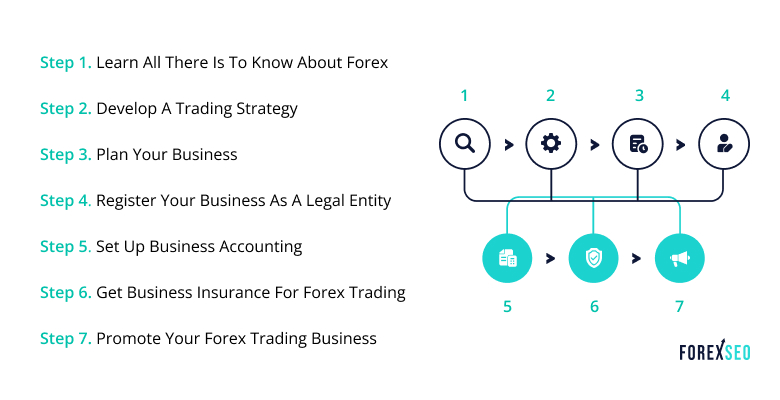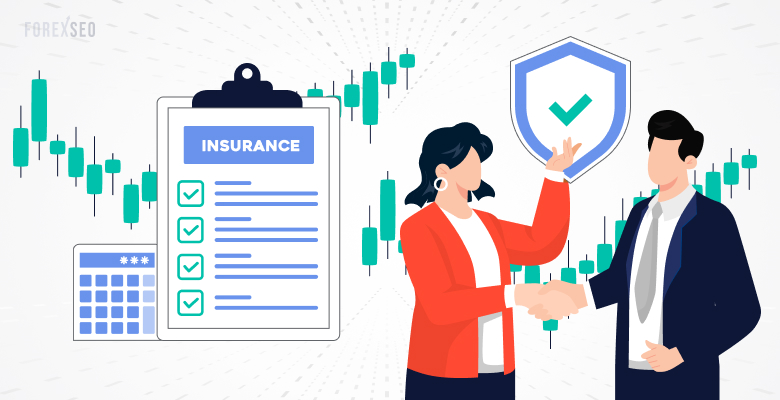How to Start a Forex Business in 2024?

If you have ever traveled outside the country, you’ve probably had to deal with currency exchange rates. If the foreign currency is worth more or less than your own, you might have made or lost money on the transaction. The statement above clarifies foreign exchange better. Generally, forex businesses buy and sell foreign currencies to profit from the changing rates.
It’s a bit like stock trading, except with currencies instead of stocks. Since there are many different stocks to choose from, there are also many other currencies to trade on the forex market. The foreign exchange market is accessible 24 hours per day in various locations across the globe, from 5 PM EST on Sunday until 4 PM EST on Friday.
Due to international time zones, forex trading occurs continuously throughout the week. But if foreign exchange rates have piqued your interest, you may be wondering how to start a trading company on your own. Here’s what you need to know about opening a currency trading business:
Forex Market Size
The forex market is the largest trading market in the world. It trades more than three times the total daily volume of the stock and futures markets combined! This vast market size gives forex traders a great opportunity to make large profits, but it also comes with certain risks. With several currencies changing daily, the forex market is very volatile.
In other words, the currency rates can fluctuate rapidly, and it’s not uncommon for prices to move by 100 pips or more in a single day. While the large market size provides ample opportunities for significant profits, it also means that forex businesses can be an excellent source of income. In any case, you may need adequate capital to cover any losses that might occur during periods of market volatility.
7 Steps to Starting a Forex Trading Business
If you decide that launching your small business in the currency trading market sounds like a good idea, here are ten steps that you’ll need to take:

Step #1: Learn All There is to Know About Forex
The first step in starting your forex business is to educate yourself about the foreign exchange market. You’ll need to understand how the market works and how it can impact your business before you can start trading.
Many online and offline resources can help you learn about forex trading, including courses, videos, tutorials, books, and articles. You could also follow influencers on social media who post educational content for forex markets. Be sure to study as much as possible to mitigate some risks involved in trading.
If you want to learn about forex quickly, it is best to learn from a professional trader or take an online course. You can also join a forex trading community to get insights and tips from other traders. These resources cost money, but they can be well worth the investment.
You may also want to open your forex account on a trading platform during this first step. This way, you can start investing your capital and generating income. Most successful traders and currency trading business owners start their forex journey by first trading with their capital.
Step #2: Develop a Trading Strategy

Before you broker any deals, you’ll need to develop a trading strategy. A forex trading strategy is a set of rules that you use to buy and sell currencies in the market. Your plan will determine when you enter and exit trades and how much you risk on each transaction.
There are many forex trading strategies, and you should choose one that fits your goals and risk tolerance.
Standard Methods
- Trend Following: This strategy involves buying currencies that are rising in price and selling those that are falling.
- Range Trading: This strategy involves buying and selling currencies within a defined range.
- Scalping: This strategy involves making many small profits from brief market movements.
- Carry Trading: This strategy involves holding a currency that pays interest and selling a currency with a lower interest rate.
- Day Trading: This strategy involves closing all positions at the end of each trading day.
Once you have chosen a strategy, you will need to back-test it to see how it would have performed in past market conditions. This step can help you identify potential flaws and make adjustments as necessary.
Step #3: Plan Your Business

For any entrepreneur, a clear plan is critical to success. It is especially true when starting a trading company, as there are many factors you’ll need to consider. Some key things to think about include:
- How will you trade (e.g., online or through a broker)?
- What services will you offer (e.g., currency exchange or money transfer)?
- How will you obtain the foreign currency (e.g., through a bank or money changer)?
- How will you market your business to potential customers?
You’ll also need to consider the legal aspects of starting a forex business, such as obtaining the appropriate licenses and permits in your jurisdiction. Be sure to consult with an attorney beforehand to ensure that you comply with all applicable laws. To open up a currency trading business, you will also need to consider its costs. These include:
- Losses on your first trades;
- Recurring software expense;
- Investment in educational resources;
- Initial advertising and marketing budget;
- Ongoing operational costs, such as rent, utilities, etc.;
- Employees (if you decide to hire any additional traders);
- Marketing (if you choose to sell your services online).
Before starting your business, you should also have a solid understanding of the potential risks involved in forex trading. These include:
- Market risk: The possibility that the prices of currencies will move against you and result in losses.
- Liquidity risk: It describes the chance you will not be able to find a buyer for your currency when you want to sell it.
- Counterparty risk refers to the risk that the other party in a transaction will not fulfill their obligations.
- Margin call risk: The risk that your broker will ask you for more money if your account value falls below the required minimum.
Once you have considered all these factors, you can start your brokerage business plan. This document should outline your goals, strategies, and how you intend to achieve them.
Step #4: Register Your Business as a Legal Entity
Registering your forex trading business as a legal entity has multiple benefits:
- It separates your personal and business finances.
- It makes your business more credible to potential customers.
- It may give you access to certain tax benefits.
Forex businesses’ most common legal structures are sole proprietorships, limited liability companies (LLCs), and corporations. The best structure for your business will depend on several factors, such as the size and scope of your business, your liability tolerance, and federal tax considerations.
For most new business owners, an LLC is the best option. This structure provides limited liability protection for your assets if your business gets sued. In other words, only your company’s assets, not your ones, would be at risk.
If you decide to register your business as an LLC, you must file the necessary paperwork with your state’s secretary of state office. The process and fees vary by state, so check with your local requirements.
Before filing your LLC paperwork, you must choose a business name. The name should be easily recognizable and reflect the services you offer.
After your LLC is approved, you will need to obtain the appropriate licenses and permits for your business. These requirements vary by state, but most forex businesses must obtain a money transmitter license.
To apply for a money transmitter license, you must submit an application, pay a fee, and provide proof of business formation and personal financial statements. You will also need to undergo a background check and fingerprinting. Once you have obtained your license, be sure to keep up with any changes in the law that could affect your business.
Once your LLC is approved and you have all the necessary licenses, you can open a bank account in the name of your business and start operating.
Step #5: Set Up Business Accounting
To track business expenses and income, you must set up accounting software or hire an accountant (or both). This plan will help you stay organized and ensure your finances are in order.
There are many different accounting software programs available, so choose one that best fits the needs of your business. You should also consider hiring an accountant if you do not have the time or experience to handle your business’s finances.
Step #6: Get Business Insurance for Forex Trading

Business insurance is not acceptable by law, but it is a good idea to have in case your business is sued or faces other financial losses. There are many different types of business insurance, so be sure to choose the one that best fits your needs. Some common types of business insurance include:
- General liability insurance: This type of insurance protects your business from liability arising from accidents, injuries, or property damage.
- Professional liability insurance: This insurance protects your business from liability arising from professional errors or negligence.
- Product liability insurance: This insurance protects your business from liability arising from defective products.
- Business interruption insurance protects your business from financial losses due to interruptions in business operations.
You may also need special insurance to protect your customers’ funds for a currency trading business. This type of insurance is “errors and omissions” insurance.
Step #7: Promote Your Forex Trading Business

The final step in starting your forex trading as a business is to promote your services. There are many ways to do this, such as online advertising, print advertising, content marketing, and word-of-mouth.
Reaching potential customers online is best to start by posting relevant content on social media platforms such as TikTok, Twitter, and LinkedIn. You can also create a website for your business and use search engine optimization (SEO) to ensure that potential customers can find you easily.
Another great form of online promotion is through forums (i.e., Reddit, Quora, Discord). You can build a positive reputation for your business by providing helpful answers and engaging in conversations. You could also host or be a guest on podcasts, which can be a great way to reach new audiences.
How Much Does It Cost to Open an FX Brokerage Firm?
To start a trading business, you only need a laptop, currency trading software, and an internet connection. Anything else (e.g., courses, supplementary resources) is an additional cost that you can choose to incur.
As for how much it will cost to open a forex brokerage firm, the answer is: that it depends. Sometimes, it could cost tens or hundreds of thousands of dollars. However, for a primary forex trading business, here is what you can expect to spend:
| Materials | Cost |
|---|---|
| Laptop | $500-$2,500 |
| Computer Monitors (for high-volume trading) | $5,000-$10,000 |
| Software expenses | $1,000 (annually) |
| Wi-Fi | $70 (monthly) |
| Insurance | $30-$45 (monthly) |
| Accounting | $35-100 (monthly) |
| LLC filing | $50-$100 (one-time) |
| Initial Investment | $5,000+ (for optimal results) |
| Staff & employment costs (for brokers) | Variable |
| Marketing (for brokers) | Variable |
| Server costs (for brokers) | Variable |
| Servicing for traders (for brokers) | Variable |
Conclusion
Forex trading can be a very lucrative business compared to other markets, but it is crucial to take the time to learn about the market and how to trade before starting your brokerage firm. Take the time to fine-tune your craft, figure out a strategy that works for you, and always consider the risk involved in any trade. And remember to always have extra cash on hand in case of emergencies.
There are lots of small businesses and individual traders who are making a killing in the forex market. If you’re willing to work through the ups and downs of currency trading, then there is no reason why you cannot achieve the same level of success. If you want the best shot at having a successful currency trading business, follow the tips in this guide and start planning your business today.






